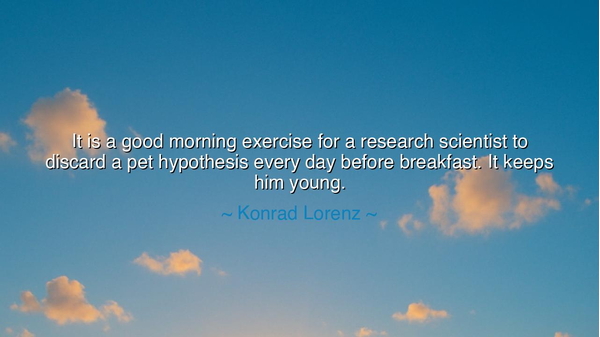
It is a good morning exercise for a research scientist to discard
It is a good morning exercise for a research scientist to discard a pet hypothesis every day before breakfast. It keeps him young.






"It is a good morning exercise for a research scientist to discard a pet hypothesis every day before breakfast. It keeps him young." These words, spoken by Konrad Lorenz, a pioneering figure in the study of animal behavior, offer a profound lesson in humility, flexibility, and the unending search for truth. In his succinct and witty observation, Lorenz underscores the essential nature of self-doubt in the pursuit of scientific knowledge. The pet hypothesis is the cherished idea, the comfortable belief that one holds dear because it fits neatly into their worldview, offering a sense of certainty and order. Yet Lorenz, with his characteristic insight, urges the scientist to challenge that comfort, to discard these beloved ideas regularly, and in doing so, to remain open to new ways of thinking. This, he suggests, is what keeps the scientist—indeed, any thinker—young, both in mind and spirit.
In the ancient world, the pursuit of wisdom was often viewed as a path fraught with challenges, where error and failure were not marks of shame but necessary stepping stones toward enlightenment. Socrates, the greatest of Greek philosophers, famously declared that knowledge begins with recognizing one's ignorance. He never clung to one singular belief but instead questioned everything, including the ideas he held most dear. For Socrates, the process of learning was not about accumulating certainties but about continuously revising one's understanding in the face of new evidence and insights. Similarly, Plato, in his writings, acknowledged that truth was ever-elusive, and that the only constant was the pursuit of it, guided by the willingness to change one’s mind when confronted with a better argument. Lorenz’s insight mirrors this ancient tradition: to be truly wise is to be flexible, to be unafraid to let go of our pet theories when they no longer serve the search for truth.
Consider the story of Galileo Galilei, whose pet hypothesis, that the Earth revolves around the Sun, was once dismissed as heresy by the powerful religious authorities of his time. Yet, Galileo, undeterred, discarded the prevailing geocentric model of the universe—one that had dominated for centuries—and embraced a heliocentric view based on his observations through the telescope. Galileo’s courage to discard the comfortable theories of his day and embrace the truth, even when it cost him dearly, speaks to Lorenz’s belief in the necessity of abandoning cherished beliefs. For Galileo, the pursuit of science was not about holding onto a pet theory, but about the unwavering commitment to discover the truth, regardless of the personal or societal cost. This willingness to discard what no longer served the cause of knowledge is what makes scientists, and all seekers of truth, resilient and young in spirit.
In the modern world, scientific progress is often marked by the regular abandonment of hypotheses that no longer hold up under scrutiny. The history of medicine, for instance, is a testament to the power of discarding pet hypotheses. Consider the once widely held belief that diseases like cholera were caused by “bad air” or “miasma.” This theory was deeply ingrained in medical thought, yet it was discarded in favor of the germ theory of disease championed by Louis Pasteur and Robert Koch. The process was not easy, and many resisted this new theory. But the courage to set aside established ideas and embrace new evidence led to transformative advances in public health and medicine. As Pasteur famously said, “**In the fields of observation, chance favors only the prepared mind.” The prepared mind is one that is open, ready to discard the old and make room for the new.
Lorenz's idea that discarding hypotheses keeps a scientist young resonates deeply with the process of growth itself. In the natural world, growth is not a linear progression but a series of iterations—a continual refining and reshaping of form. The young are constantly changing, adapting, and learning, often abandoning old ways of thinking as they grow. As we age, we often become more set in our ways, clinging to familiar patterns and beliefs. Lorenz reminds us that intellectual growth requires the same dynamic process—discarding, evolving, and renewing our ideas in order to remain flexible and open-minded. This is the true essence of wisdom—not the accumulation of answers, but the ability to constantly question and evolve in response to new insights.
The lesson from Lorenz’s words is profound: in the pursuit of knowledge, be it in science, philosophy, or personal development, we must constantly challenge our own beliefs and assumptions. The act of discarding a cherished hypothesis is not a sign of failure, but of growth. It is the willingness to accept that the answers we hold today may not be the answers of tomorrow. To be a true seeker of truth is to be humble enough to recognize that no theory is final, no discovery complete, and that the search itself is a journey, not a destination.
In your own life, consider how you approach your beliefs and ideas. Do you cling tightly to the theories and assumptions that once served you, or do you welcome change and growth? Just as a researcher must discard outdated hypotheses, so too must we reexamine our own beliefs in light of new experiences and understanding. Challenge your assumptions regularly, for it is through this process of questioning and revising that we remain alive to new possibilities, youthful in our ability to adapt, and wise in our openness to the evolving truths that shape our world. Like Socrates, approach life with a willingness to let go of the old and embrace the new, knowing that wisdom is not in what we know, but in how we remain open to learning.






AAdministratorAdministrator
Welcome, honored guests. Please leave a comment, we will respond soon